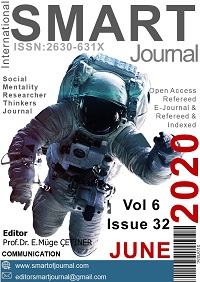Author :
Abstract
Bu araştırmanın amacı, Koronavirüs sorası eğitim uygulamalarının nasıl olacağına ilişkin öğretmenlerin; öngörülerini, önerdikleri alternatifleri, değişimin gerekçeleri ve alınması gereken tedbirlere dair görüşlerini belirlemektir. Araştırmanın gerçekleştirilmesinde nitel araştırma yönteminden yararlanılmıştır. Araştırmanın çalışma grubunu, Düzce ilinde değişik eğitim basamaklarında ve faklı branşlarda, Koronavirüs öncesi yüz yüze eğitime ve Koronavirüs sürecinde uzaktan eğitim sürecine katılmış olan 20 öğretmen oluşturmaktadır. Öğretmenler Koronavirüs süreci ile başlayan değişim sürecinin Koronavirüs sonrasında da devam edeceği ve kalıcı olacağı görüşündedirler. Eğitim uygulamalarındaki değişimin ağırlıklı olarak uzaktan eğitim yönünde olacağını düşünen öğretmenler yüz yüze eğitime geri dönülse bile yine sosyal mesafe kurallarına uygun bir değişimin olacağını belirtmektedirler. Öğretmenler öğretim teknolojilerinin olanaklarından ve uzaktan eğitim imkanlarından aktif olarak yararlanılmasının yanısıra yüz yüze eğitimin olumlu yönlerinin sisteme entegre edilen yeni eğitsel uygulamaların oluşturulması gerektiğini savunmaktadırlar. Onlar değişimin amaçlı, sistemli ve koşullara uygun işlevsel olmasını önermektedirler. Öncelikle derslerin özellikleri; kuramsal, uygulamalı, deneysel olmanın yanısıra beceri kazandırmaya yönelik olan derslere göre de uygun eğitsel uygulamaların geliştirilmesinin önemini vurgulayan öğretmenler pedagojik ve teknolojik destekli konu alanı uygulamalarının verimli olacağı görüşündedirler. Öğretmenler koronavirüs sonrası eğitim uygulamalarında iki önemli alternatifi önermektedirler. Bunlardan ilki pedagojik özellik taşıyan, öğretim teknolojileri destekli eşzamanlı/senkron olarak gerçekleşen uzaktan eğitim uygulamalarıdır. Diğeri ise öğretim teknolojileri destekli, sosyal mesafe kurallarına uygun olarak hazırlanmış fiziki ortamlarda gerçekleşen yüz yüze eğitimdir.
Keywords
Abstract
The purpose of this research, determine the opinions of the teachers about Education applications after coronavirus; predictions, recommended alternatives, reasons for change and measures to be taken. Qualitative research method was used in this research. The study group of the research consists of 20 teachers who participated in various education steps and different branches in Düzce, pre-coronavirus face-to-face education and distance education process in the coronavirus process. Teachers are of the opinion that the change process that starts with the coronavirus process will continue and remain permanent after the coronavirus. Teachers who think that the change in education practices will predominantly be towards distance education indicate that even if they return to face-to-face education, there will be a change according to the social distance rules. In addition to the active use of educational technologies and distance education opportunities, teachers argue that the positive aspects of face to face education should create new educational practices integrated into the system. Teachers recommend that the change be purposeful, systematic and functional in accordance with the circumstances. First of all, the features of the courses; It can be theoretical, practical, experimental. Teachers who emphasize the development of appropriate educational practices according to the lessons aimed at gaining skills are of the opinion that pedagogical and technologically supported subject area practices will be efficient. Teachers recommend two important alternatives in post-coronavirus education practices. The first one is pedagogical distance education applications that are supported simultaneously / synchronously with instructional technologies. The other one is face-to-face education that takes place in physical environments supported by instructional technologies and prepared in accordance with social distance rules.
Keywords
- Arkan, A. (2020). Koronavirüs Sonrası Eğitim. https://www.setav.org/koronavirus-sonrasi-egitim/.
- Arkan, A. (2020). Koronavirüs Sonrası Eğitim. https://www.setav.org/koronavirus-sonrasi-egitim/.Erişim tarihi 16.05.2020.Bayham, J. P & Fenichel, E. P. (2020). Impact of school closures for COVID-19 on the US health-care workforce and net mortality: a modelling study. Published by Elsevier Ltd. This is an Open Access article under the CC BY-NC-ND 4.0 license.
- CDC, 2019. Helping children cope with emergencies. https://www.cdc.gov/ childrenindisasters/helping-children-cope.html. Erişim tarihi 16.05.2020.
- Cohen, L., & Manion, L. (1997). Research methods in education. London: Routledge.
- Cohen, L., Manion, L., & Morrison, K. (2007). Research methods in education (6th Ed.). New York, NY: Routledge.
- Corbin, J., & Straus, A. (2008). Basics of qualitative research: Technique and procedure for developing grounded theory. USA: Sage Publication.
- Finch, H., & Lewis, J. (2003). Focus group. (In Qualitative Research Practice: A Guide For Social Science Students and Researchers, Ed. Jane Ritchie & Jane Lewis), 170-198. London: Sage
- Francisa, N. N. & Pegg, S. (2020). Socially distanced school-based nutrition program under COVID 19 in the rural Niger Delta. The Extractive Industries and Society. Article in press.
- Karen Joy B. Talidong & Cathy Mae D. Toquero (2020): Philippine Teachers’ Practices to Dealwith Anxiety amid COVID-19, Journal of Loss and Trauma, DOI: 10.1080/15325024.2020.1759225.
- Liua,S., Liub,Y. & Liuc, Y. (2020). Somatic symptoms and concern regarding COVID-19 amongChinese college and primary school students: A cross-sectional survey. Psychiatry Research journalhomepage: www.elsevier.com/locate/psychres. https://doi.org/10.1016/j.psychres.2020.113070.MEB. (2020) Milli Eğitim Bakanlığı Uzaktan Eğitim Uygulama kararı. http://www.meb.gov.tr/uzaktan-egitim. ErişimTarihi. 16.05.2020.
- Miles, M. B. & Huberman, A. M. (1994). Qualitative data analysis: An expanded sourcebook. (2nd ed.). Thousand Oaks, California: Sage Publications.
- National Health Commission of the People's Republic of China- NHCPR. (2020). Handbook ofprevention and treatment of the pneumonia caused by the novel coronavirus (2019- nCoV).http://www.nhc.gov.cn/yzygj/s7653p/202003/46c9294a7dfe4cef80dc7f5912eb1989.shtml. NHCPR.Özer, M. (2020). Educational policy actions by the ministry of national education in the times of COVID-19. Kastamonu Education Journal, doi: 10.24106/kefdergi.722280.
- Viner,R.M., Russell, S.J., Croker,H., Packer, J., Ward, J., Stansfield,C., Mytton,O., Bonell, C. &Booy, R. (2020). School closure and management practices during coronavirus outbreaks including COVID-19: a rapid systematic review. www.thelancet.com/child-adolescent Vol 4 May 2020.
- YÖK. (2020). Cavid-19 Bilgilendirme. https://covid19.yok.gov.tr/AnaSayfa. Erişim tarihi 16.05.2020.
- YÖK. 2020. YÖK, Üniversitelerde Dijital Ortamda Gerçekleştirilebilecek Sınavların Temelİlkelerini Açıkladı. https://www.yok.gov.tr/Sayfalar/Haberler/2020/universitelerde-dijital- sinavlarin-temel-ilkeleri.aspx/ Ankara, Erişim tarihi: 27 Mayıs 2020.
